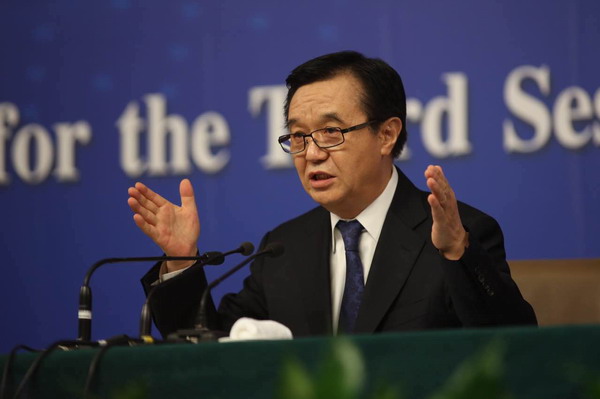Government plans to reform foreign investment law
By Dai Tian, Wang Jingjing, Zhao Tingting and Cai Muyuan (chinadaily.com.cn) Updated: 2015-03-07 11:31
 |
|
China's Minister of Commerce Gao Hucheng takes questions from journalists at a news conference during the ongoing two sessions in Beijing, March 7, 2015. [Wang Jing/ chinadaily.com.cn] |
China will reform the laws on foreign investment to create a more stable, transparent and predicable legal framework for investment, said Gao Hucheng, Minister of Commerce, on Saturday at a press conference.
The three laws governing foreign investment, the Law on Sino-foreign Equity Joint Ventures, the Law on Wholly Foreign-owned Enterprises and the Law on Sino-foreign Corporative Joint Ventures, was promulgated during the initial phase of China's reform and opening-up.
Gao said laws have contributed a lot to in attracting foreign investment, but some articles and contents cannot keep up with the current development.
The ministry released the draft law in January, and will revise and improve it to promulgate it as soon as possible, said Gao.
Spending spree overseas
More than 100 million Chinese took foreign trips in 2014 and their overseas consumption surpassed 1 trillion yuan ($159.62 billion), said Gao Hucheng, Minister of Commerce, at a press conference on Saturday.
The main reason for the boom in overseas consumption is the price difference between the domestic and international markets, according to the minister of commerce.
The difference was primarily caused by high taxes and fees, especially the consumption tax on certain products, high cost of domestic circulation and price strategies of foreign brands, Gao added.
Other highlights at the press conference are given as follow.
China, US complete text negotiation on BIT
Based on the consensus of presidents of the two countries, and after nine rounds of substantive negotiations, China and US have basically completed the text negotiation on Bilateral Investment Treaty (BIT).
Then, early this year, the two sides will change negative lists.
The completion of negotiation and the signing of the China-US BIT will have significant implications on global investment rules, said Gao.
Export growth will turn positive in March
China's export and import will end contraction and usher in a positive growth in March.
The foreign trade in February, based on the analysis of leading indicators, will remain a negative growth, but the decline rate will narrow significantly, said Gao.
Trade in January fell by more than 10 percent, with export sliding by 3.2 percent and imports plunging 19.7 percent, according to data from General Administration of Customs.
The country plans to set this year's target for foreign trade growth to 6 percent from 7.5 percent, announced Premier Li Keqiang in the draft work report.
"Provided a fairly same environment with no significant changes compared to last year, international demand will remain a moderate growth, and we are confident to achieve the target," said Gao.
Apart from non-comparable factors, China's foreign trades grew 6.1 percent in 2014, with export up 8.7 percent, said Gao, adding that the sharp price decline in import commodity was the main reason why last year's target was missed.
Gao said the export growth in 2014 was a satisfactory, given the base of years of 9 percent growth from 2008.
"A fundamental estimate is that until now, we can't see any sign of a quick rebound to the price of resources, energy and bulk farm products," said Gao.
- Israel requests to join Asian Infrastructure Investment Bank
- Chinese stocks rebound on April 1
- China, the West in Africa: more room for cooperation than competition
- Nanjing cuts taxi franchise fees
- Air China increases flights to Milan, Paris
- JD.com raises delivery charges
- Veteran corporate strategist upbeat about China economy
- L'Oreal China sales revenue up 7.7% in 2014

















